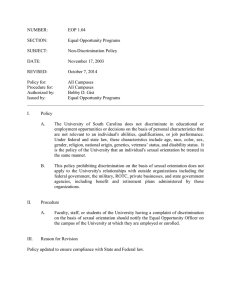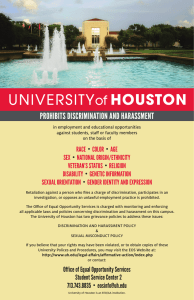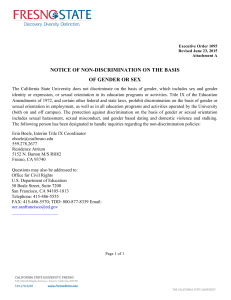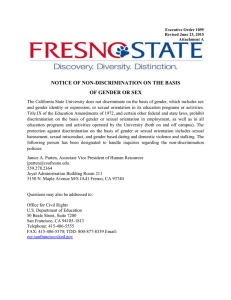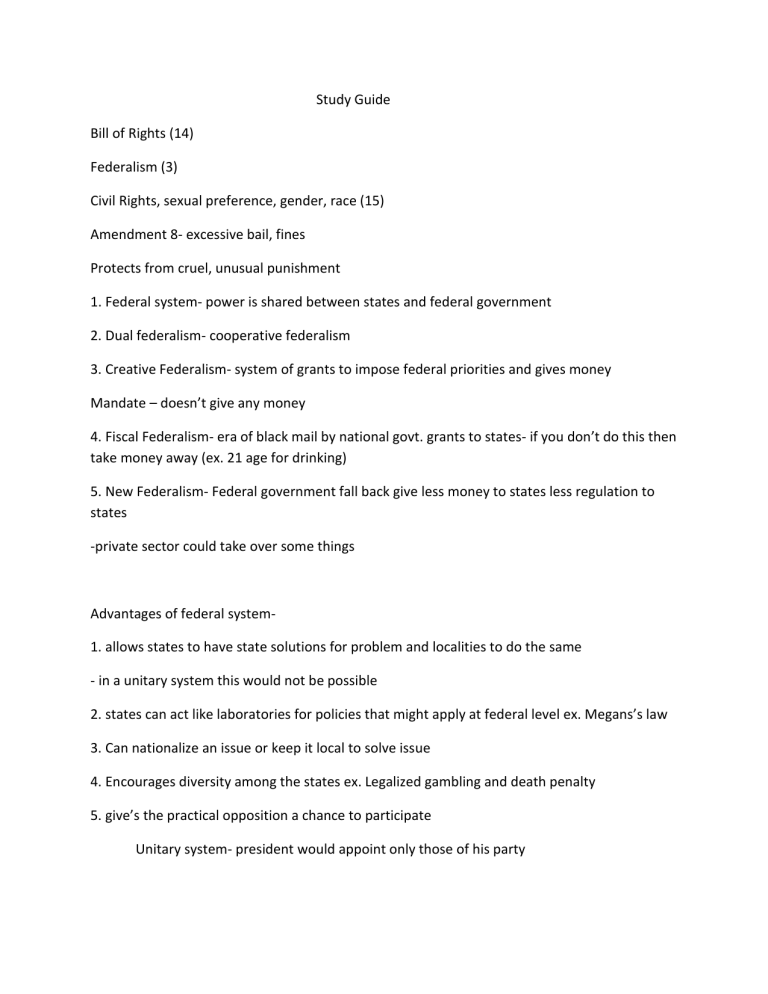
Study Guide Bill of Rights (14) Federalism (3) Civil Rights, sexual preference, gender, race (15) Amendment 8- excessive bail, fines Protects from cruel, unusual punishment 1. Federal system- power is shared between states and federal government 2. Dual federalism- cooperative federalism 3. Creative Federalism- system of grants to impose federal priorities and gives money Mandate – doesn’t give any money 4. Fiscal Federalism- era of black mail by national govt. grants to states- if you don’t do this then take money away (ex. 21 age for drinking) 5. New Federalism- Federal government fall back give less money to states less regulation to states -private sector could take over some things Advantages of federal system1. allows states to have state solutions for problem and localities to do the same - in a unitary system this would not be possible 2. states can act like laboratories for policies that might apply at federal level ex. Megans’s law 3. Can nationalize an issue or keep it local to solve issue 4. Encourages diversity among the states ex. Legalized gambling and death penalty 5. give’s the practical opposition a chance to participate Unitary system- president would appoint only those of his party Disadvantages1. local policy sometimes conflicts with deferral policy -supremacy clause- federal supersedes state 2. Suplication of effort- overspending -buckpassing- fed passes responsibility to states, states passes responsibility to localities then it does not get done 3. Competition and conflict among the states ex. Businesses- 10 yr amoritorium on taxes -draw businesses away from other states 4. lack of uniformity of law Ex. If move from one state to another must figure out laws -legal marriage ages 5. Unequal distribution of wealth among states Progression of federal power infringing on states Causes1. Supreme Court rulings – gave federal government more power 2. Federal government has more resources so they have more influences 3. Great Depression- gave federal government power more power 4. Global economy- Federal government face of global economy 5. As people become more mobile they desired uniform laws 6. Problem of urban areas require federal solution (some argue) 7. Change has come for equity - Federal government must give to poorer states for social services Full Faith and Credit Clause- One state must honor laws and contracts of another state Privileges and immunities clause- One state must grant immunities and privileges of another state that are granted in their state How states cooperateExtradition- if criminal commits a crime in one state and flees to another state, governor in state which has criminal can decide whether to keep them or send them back Interstate compact- if one state has a service and another state doesn’t can collaborate with other states to provide them ex. Port authority Cooperation between states for the exchange of information Civil liberties- free from government action Civil rights- government protects rights Property rights- middle states, southern states - New England states- church membership All white men could vote 15th Amendment- former mal slaves the vote 19th amendment- all women were given the right to vote Disenfranchisement- deices in the southern state “grandfather clause” Literary test- arbitrary Poll tax- disenfranchised the poor Intimidation 1rst barrier to equality- slavery Dredd v. Stanford- Supreme court said slaves were not citizens but private property Jim Crow Stage- mandated segregation Plessy v Ferguson- segregated but equal Brown v. Board of Ed- school unsegregated Dejure segregation- segregation by law Did not end de facto (segregation by practice) 3rd BarrierPrivate Action- Owners of private businesses excluded African Americans from their businesses Civil disobedience- purposefully breaks laws to call attention to their cause Rosa ParksIntegrated armed forces- Harry Truman Executive order- order signed by president which has the force of law which does not need congressional approval - Check- supreme court can overturn if they determined unconstitutional First Civil Rights Act- 1957- Created civil rights commission Made it a federal o Ended literacy tests intimidation 1964 civil rights act- Ends private action- they cannot discriminate hotels, motels, restaurants and they cannot discriminate in employment, education, public accommodation, based on race, sex, color, national origin, religion, or sex Equal employment opportunity commission- provide for federal inspectors to the south to try to stop intimidation that was going on 1968- civil rights act- prohibited restrictive covenants, people were putting clauses for home sale that person being sold house could not sell to black person Outlawed redlining- banks refused to grant mortgages in African American neighborhoods Provided federal money for enforcement anyone receiving money that discriminates would have money withdrawn. Continues to be structural, historical, and cultural barriers 1967- Johnson “soft” affirmative action Training, recruitment, affirmative action has to be used to make up for past discrimination 2nd- Nixon “hard” affirmative action- hiring, firing, and promotion University of California v. Bakke- white male sued university for discrimination 1. Bakke had to be admitted 2. affirm upheld Problems in the workforce1. glass ceiling - being a mother- women are primary caregivers - women CEO’s less likely to have children -discrimination - women are less assertive 2. lack of equal pay- comparable worth program -80 cents/ $100 - equal pay act 1963 Women are more likely to have pink collar jobs - Secretaries, household workers, nurses 3. sexual harassment- hostile work environment Meritor Savings v. Vinson a. sexual harassment is sexual discrimination under 1964 civil rights act b. creating hostile work environment is sexual harassment Harris v. Forklift Systems Job performance suffered Psychological damage “Reasonable woman test” Oncale v. Sundowner Services- same sex harassment 4. discrimination 5. pregnancy protection- 1978 pregnancy discrimination act - GE not providing health insurance coverage to pregnant women 6. lack of family leave1993 fair medical leave act 12 wks birth, adoption, personal illness, to care for spouse, child, parents, pay optional Benefits continue NJ disability ( maternity leave) 4 wks before birth 66 2/3% 7. mommy track Leaves work force for period of time to have a child, when come back to work are not able to start at the same place that they left off Business policies- family friendly policies - On site childcare Subsidized day care Emergency backup care- for very valued employees Flex time- will allow a parent to work 7-3 Job sharing- 2 people share 1 job Telecommuting- person works from home Compressed work load- 4 ten hour days - Prorated benefit- vacation for part time etc. Sexual harassment Home- problems - Lack of quality affordable day care Elder care Civil Rights and Sexual Preference- Is not federal protection 30 states can be fired for sexual preference o NJ does provide protection - Need protection housing, public accommodation, credit Initiative referendum- gets rid of past ones and prevents future ones from being passed Romer v. Evans- deny protection from discrimination overturned because denied homosexuals equal protection under the law History of Gay Rights movementMattachine society- network of support among homosexuals Daughters of Blittis- the ladderWanted to educate people about homosexuality 1969- Stonewall riots in NYC- kick off gay rights Bar popular with gays, police were harassing, riot ensued, led to week of riots, led to gay pride parades Land of legal defense fund- helps with discrimination cases 1973- American psych association removed homosexuality from lists of mental disorders Anita Bryant- developed save our children campaigns Tried to get law overturned that protected gays from discrimination - She was able to get law repealed 1986- Bowers v Hardwick- Georgia law o Supreme court said states would make homosexuals conduct illegal 1990- a law prohibiting entry into the US if gay this law voided it Hate crime statistics act- justice dept. collect and publish data on hate motivated crime o Race, religion, ethnicity, sexual orientation * not gender 1998- Matthew Shepard Bias incident- NJ law o Race, religion, color, ethnicity, sexual orientation, disability, or gender o Hate crime- bias intimidation (1 level up) Name calling, inappropriate gestures or behaviors Attempts or commission- crimes of violence -1992- Bill Clinton was not able to sign executive order disallowing discrimination in the military - Established- do not ask, don’t tell policy - When a person signs up for military can’t ask sexual preference- when they are serving they are not allowed to reveal their preference Executive orders- banned discrimination in federal work force by sexual discrimination Overturned 50 year security clearance ban on homosexuals Defense of Marriage Act- If one state passes gay marriage then other state does not have to recognize it- violates full faith and credit clause Gays Ability to adopt children- Florida bans this- only state 11 states and DC- sexual preference can’t be used o Can’t be banned 1996- Florida awarded custody to father because mother was lesbian and father served prison time for murder Company PolicyUnited Auto Workers- pressured GM to contract to ban discrimination on sexual preference 2000- Union- give benefits to same sex partners Lawence v. Texas- Overturned Bower v. Hardwick- state could enforce sodomy law Overturned it using right to privacy (Griswald) which was used in Roe v. Wade Griswald established right to privacy-implied many amendments - search and seizure Descent- slippery slope argument Protections by stateCalifornia- banned discrimination of students and teachers - Right to sue for wrongful death, adopt a partners child Same sex marriage not promoted1. Organization pro gay rights, rather fight for anti- discrimination - polls show American support this 2. Activities of right wing Christian Groups Americans with disabilities ActProtects people with disabilities in employment, public accommodations, public transportations, telecommunications When a building is newly constructed or new renovations- must make it handicapped accessible - Must be “readily achievable” Business must provide accommodation unless cause “undue hardship” Tax credits for handicap access and other handicap related things Additional lawyers Public accommodation- have to be made available to disabled New buses, subways, etc wheel chair access Telephone services- relay Dupont- disabled- loyal worker Key TermsBill of Rights- First ten amendments First Amendment- Freedom of expression which include freedom of speech, assembly, and association. Freedom of religion Freedom of speechSeditious Speech- encourages rebellion against the government Red Scare- people feared conspiracies to overthrow the US government- large scale crack down on so called seditious activities McCarthyism- Methods of combating communism characterized by irresponsible accusations Fighting Words- when spoken face to face, prompt listeners to respond with a punch Hate speech- derogatory speech – racial, ethnic, sexual, or religious slurs- usually aimed at a group rather than at a individual Sexual Speech- situations that fall short of the legal definition of obscenity has been prohibited Public Forum- a public place such as a street where people have the right to express their views on issues Symbolic Speech- the use of symbols rather than words to convey ideas ex. Wearing black armbands Freedom of Associations- guarantees the right of an individual the right to join with others to speak, assemble, and petition the government for redress of grievances. This allows a minority to pursue interests without being prevented from doing so by the majority Freedom of the press- freedom from censorship so the press can disseminate the news, information, and opinion that seems appropriate Libel- printed or broadcast statements that are false meant to trash someone’s reputation Separation of church and state- constitutional principal that is suppose to keep church and state from interfering with each other. In practice restricts government from major efforts either inhibit or advance religion Free exercise clause- first amendment clause that guarantees individuals the right to practice their religion without intervention from the government Establishment clause- prohibits establishment of a state religion Due Process- 14th amendment that government will follow fair and just procedure when prosecuting a criminal defendant Presumption of innocence- government is required to prove the defendant’s guilt. Defendant is not required to establish this innocence Unreasonable search and seizure- searches and arrests that are performed without a warrant or that fall into one of the exceptions to the warrant agreement Exclusionary rule- a rule that prevents evidence obtained in violation of the 14 th amendment from being used in court or against the defendant Miranda right- a means of protecting a criminal suspects rights against self incrimination during police interrogations. Miranda v. Arizona Right to council- criminal defendant to have an attorney in any felony or misdemeanor cases that might result in incarceration if they are not able to pay the court must appoint them a lawyer Right to a jury trial- guarantees the right to a jury trial in any criminal case that could result in more than 6 months incarceration Cruel and unusual punishments- torture or any punishment that is grossly disproportionate to the offense Plea bargain- prosecutor, defense attorney, and defendant agree on a reduced charge for the exchange of a guilty plea Right to abortion- roe v wade established women have a right to terminate their pregnancy during the first 6 months. States can prohibit abortion during the last three months because then it is viable Rendition- CIA seizes terrorist suspects in foreign countries and takes them to other countries for interrogation. The purpose is to have other countries use methods for interrogation often torture that the US would not use National Security Agency- governments largest intelligence service, which uses electronic surveillance to obtain the communication of possible adversaries Civil rights- equal rights for persons regardless of their race, sex, or ethnic background Dred Scott Case- case in which the US Supreme court upheld that blacks whether slave or free were not citizens and congress had no power to restrict slavery in the territories contributed to the polarization between North and South and ultimately to the civil war Equal protection clause- guarantee that everyone is equal under the law Jim Crow laws- laws enacted in southern states that segregated schools, public accommodations, almost all other aspects of life Plessy v. Ferguson- Supreme Court upheld segregation using “separate but equal” Separate but equal doctrine- allowed for separate facilities between whites and blacks as long as they were equal NAACP- organization to fight for black rights, its attorneys challenged segregation in courts and won many Brown v. board of ed Brown v Board of Ed- US overthrew separate but equal doctrine and rule unanimously that segregated schools violated 14th amendment De jure segregation- segregation imposed by law, outlawed by brown v board of ed and subsequent court cases Restrictive covenants- agreements among neighbors in white residential areas not to sell their homes to blacks Steering- practice in which retailers promoted segregation by showing blacks houses in black neighborhoods and whites houses in white neighborhoods Blockbusting- a practice in which realtors would frighten whites in a neighborhood where a black family had moved in telling the white that their homes would decrease in value. Whites in panic would sell their house to the realtors at low prices and the realtors would resell to blacks thereby resegregating the area from white to black Redlining- bankers and other lenders refused to lend money to persons who wanted to buy a house in a racially changing neighborhood Civil rights act of 1968- prohibits discrimination in the sale or rental of housing on the basis of race, color, religion, or national origin and prohibits blockbusting, steering, and redlining Civil rights act of 1964- prohibits discrimination on the basis of race, color, religion, or national origin in public accommodations Racial profiling- practice that targets a particular group for attention from law enforcement based on racial stereotypes Bilingual education- program where students whose native language is not English receive instruction in substantive subjects such as math in their native language Equal rights amendment- amendment that would prohibit government from denying equal rights on the basis of sex, but failed to be ratified by a sufficient number of states Pregnancy discrimination act- prohibits firing or demoting an employee for becoming pregnant Equal pay act- mandates that women and men should receive equal pay for equal work Living wage- high enough to allow full time workers to meet the basic cost of living, something the minimum wage foes not do Comparable worth- principle that comparable jobs should pay comparable wages Title IX- equal opportunity in education act that forbids discrimination on the basis of sex in schools and colleges that receive federal aid. Federalism-a system where power is divided between a central government and subnational or local governments Confederal system- central government has only the powers given to it by the subnational governments Unitary system- national government is supreme subnational governments have only the powers that are allocated to them Mischief’s of faction- a phrase used by James Madison in the federalist papers to refer to the threat to that nations stability that factions could pose Necessary and proper- a phrase in the implied powers clause that gives congress the power to make all laws needed to carry out its specific powers Implied powers clauses- clause in the US that gives congress the power to make laws necessary and proper for carrying out specific powers Supremacy clause- a clause in the US constitution stating that treaties and laws made by the national government take precedence over state laws in cases of conflict Tenth amendment- states that powers not delegated to the federal government nor prohibited by the states are reserved to the states and to the people. Nationcentered federalism- the view that the constitution was written by representatives of the people and ratified by the people it believes the national government is the supreme power in the federal relationship. Dual federalism- idea that the constitution created a system in which the national government and the state have separate grants of power with each supreme to its own sphere State centered federalism- view that our constitutional system should give precendence to state sovereignty over that of the national government and they argue that the states created the national government so they are superior to national government McCulloch v. Maryland- decision that broadly interpreted congress’s powers under the implied powers clause New Deal- program aimed at stimulating the economy and aiding the victims of the great depression led to expansion of the national governments role Devolution- delegation by the national government to lower units of government to make and implement policy Cooperative federalism- day to day cooperation among federal, state, and local officials in carrying out the business of government Unfunded mandates- federal laws that require the states to do something without providing full funding for the required activity Full faith and credit clause- requires states to recognize contracts that are valid in other states Home rule- the grant of considerable autonomy to a local government
